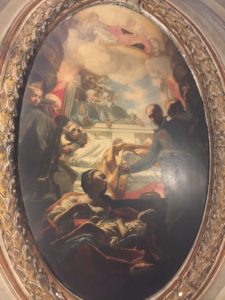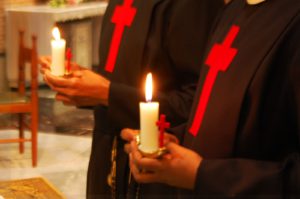SHARED MESSAGE
The Camillians– the Daughters of St. Camillus– the women Ministers of the Sick
Young People, Faith and Vocation: a Shared Yearning for Holiness!
 ‘Oh miserable and unhappy me what great blindness has mine been not to know the Lord before? Why have I not spent all my life in serving him? Forgive me Lord, forgive this great sinner…Saying and repeating many times the following words: no more world, no more world’.
‘Oh miserable and unhappy me what great blindness has mine been not to know the Lord before? Why have I not spent all my life in serving him? Forgive me Lord, forgive this great sinner…Saying and repeating many times the following words: no more world, no more world’.
Sanzio Cicatelli, Vita del p. Camillo de Lellis, p. 46.
To our young consecrated men and women, to young people in formation and to young people who are searching in us for a source of inspiration for the discernment of their vocations in life!
A desire to know God;[1] a need for humanising human relationships;[2] and an aspiration to follow Jesus, like him carrying a cross,[3] our cross and the crosses of the crucified brethren we encounter. These were the three incandescent pathways that were also ‘unleashed’ in the life of the young Camillus de Lellis starting on 2 February 1575 in a man who up to that moment had lived as though God did not exist, occupied in other thoughts and affairs which degraded his humanity and the humanity of other people.
That day, at the age of twenty-five, aware of the failure of his life, Camillus discovered God. He met Him when reflecting on the misery of his condition, thinking again about the spiritual exhortations communicated by the good friar Angelo and guided by a strong interior light: ‘why have I been so blind up till now not to know and to serve my Lord?’ A personal relationship with God was born. Camillus experienced the mercy of God, he asked Him for forgiveness, and he thanked Him for waiting so long for him. With his relationship with God changed, his relationship with man also changed: every frail and suffering man and woman was now a brother or a sister to be loved for God, a suffering and dying Christ to be cared for and comforted. After him, anybody ‘inspired by the Lord God’ who wanted to follow him in this complete service to the suffering would do this ‘for true love of God’, to ‘please the will of God’, ‘for the glory of God’ (cf. Formula of Life). The young Camillus found the ‘meaning’ of his existence and tenaciously invested the best of his energies in it. This interior fire was the same that has animated the choice of every consecrated man or woman and which continues to move the life of every young person who, in an approach marked by honesty, searches for the meaning of his or her life.
This existential experience of conversion of the young Camillus is dear to all of us – men and women who one day embraced his charism. Camillus from the depths of his human poverty, after losing everything in life, looked with humble and troubling humility not only for a job by which to survive but also for a meaning to his life. On this journey, in an unexpected and mysterious way, he met God, and this became the totalising experience of his life. This story of Camillus, which was characterised by a radical change in his life, has a profound meaning still today for a humanity that is wounded by poverty and by illnesses, and principally speaks to the hearts of today’s young people.
Some apprehensions about the religious and vocational context in which we live
After the lively two synodal assemblies on the family of October 2014 and October 2015, at the end of which Pope Francis published his apostolic exhortation Amoris laetitia, the Supreme Pontiff convoked a new ordinary general assembly of the synod for October 2018 on the subject ‘Young People, Faith and Vocational Discernment’. Its intention is to accompany young people on their existential pathways towards maturity so that through a process of discernment they can discover their life projects and implement them with joy, opening themselves to encounter with God and men and taking part actively in the building up of the Church and society.
‘In the future will there still be a priest, a man religious or a woman religious in our parish or our Christian community, in our work of evangelisation and/or charity?’ Those who have not spoken or heard this phrase should put up their hands! The various vocations in the Church have a single purpose: to search for the meaning to be given to people’s lives and, at the same time, to point out concrete ways by which each one of us can take part in the building up of the one Body of Christ.
If we look at what is happening in the Church, and in our male and female religious Institutes in particular, employing an outlook that is authentically Christian, illuminated by faith, young vocations overall display a positive trend, but in this case, as well, some reasons for concern come from Europe and North America where over recent years the decline has been evident. Vice versa, Africa and Asia display a great vitality, revealing that God loves His Church, is not distant from it, and does not abandon it.
The life of the Church and our religious Institutes has experienced a process of systole and diastole, of diffusion and then concentration. Today a time of concentration seems to have arrived which does not in the least abandon great numbers (where they exist or where they could soon exist) but, in substantial terms, experiences the need for a regeneration and a revitalisation of our religious fabric through the creation of small or large communities which illumine our pathways towards a more generalised rebirth.
We cannot, therefore, think that God has stopped calling young people to follow Him. The voice of God, since it does not on its own need any human mediation to reach us, has chosen, as an ordinary route, to reach us through other men and women. The proposal reaches a teenager or young person, whether a boy or a girl, through their families, through the lives and witness of other believers, through other young people, through friends, through travelling companions ‘and a sign of this is joy: the joy of observing, of walking within a rule of life; the joy of being led by the Spirit, never unyielding, never closed, always open to the voice of God that speaks, that opens, that leads us and invites us to go towards the horizon’. [4] A vocation matures in very many encounters and often brings out the vivacity or aridity of a Christian community, that is to say its holiness.
And so both for young people and for us the healthy recommendation applies: we should not be afraid of being the saints of the third millennium! Let us not abandon these courageous prophetic words which are also the secret of your, and our, happiness. The desire to be happy is the greatest dream and project that we carry in our hearts and which humanises us, enabling us to cultivate a renewed fraternity made up of welcome, of respect, of mutual help, of forgiveness and of joy.[5]
Looking for the face of Jesus: the source and meaning of our existence
 It is Jesus whom we seek when we dream of happiness. For this reason, we, like the sentries of morning (Is 21:11), want our freedom to be directed towards the mysterious and fascinating project that God has for each one of us – still immersed in darkness but with our hearts already launched and vibrating towards the dawn. However, we must cultivate – like Jesus – the courage to go through the city of men (Mt 9:35), passing through crowds, a city often populated by frailty and suffering, in the name of Jesus, and knowing how to stop courageously and be with this humanity that prays, without passing by on the other side (Lk 10:33), not privatising love but always seeking the good of the other person, above all in the sharing of their joys and pains, frequenting the fringes of the human heart.
It is Jesus whom we seek when we dream of happiness. For this reason, we, like the sentries of morning (Is 21:11), want our freedom to be directed towards the mysterious and fascinating project that God has for each one of us – still immersed in darkness but with our hearts already launched and vibrating towards the dawn. However, we must cultivate – like Jesus – the courage to go through the city of men (Mt 9:35), passing through crowds, a city often populated by frailty and suffering, in the name of Jesus, and knowing how to stop courageously and be with this humanity that prays, without passing by on the other side (Lk 10:33), not privatising love but always seeking the good of the other person, above all in the sharing of their joys and pains, frequenting the fringes of the human heart.
Jesus spoke in the streets; he went into people’s homes; he did not create differences; he knew how to cause wonder; and he was discreet and decisive. As he passed by, praise went up to God because he proclaimed the Gospel. Let us cultivate the three decisive instructions that the evangelist Luke entrusted to the Christian community through the page on Zacchaeus (Lk 19:1-10) and which we can perceive in an exemplary way in the life of St. Camillus, of our founders Luigi Tezza and Giuseppina Vannini, Maria Domenica Brun Barbantini and Enrico Rebuschini, and of a long series of consecrated men and women. This solid tradition should accompany us, nourish our lives, and be the soul of our hope about the future.
- We should have the strength to look for Jesus. Something attracted Zacchaeus in an irresistible way towards Christ; however, something made him feel very distant from him. At times we feel small, we do not feel up to situations, and often there are few of us. We have to go up in a tree, listen to the Word of God, and receive His invitation to enter a singular relationship with Him. We should support the primacy of the Word in order to keep the Bible in our hearts; we should ask for the gift of prayer and the vitality of the ‘transcendent inside us’ in order to be able to see Jesus because this is the setting of intimate communion with God and the source of joy that every young – and not so young – person is called to pronounce with his or her own life.
- We should construct experiences of fraternal life according to the truest tradition of our consecrated lives (Acts 2:42-45). To be listened to, the Word of God needs a community context, and the Eucharist needs a real table at which to share life. We have the joy of a common home – an authentic and real domus ecclesiae. The Lord wants our love to be singular, faithful, capable of the greatest gift of ourselves, body and soul – we need think only of the disconcerting radical character of our religious vows – in the singularity of each vocation, rekindling a little the enthusiasm of our youth and its generous promises made to the Lord and to our neighbours in need.
- We should be near to the poor, to the poor of all categories (poor as regards bread, affection, learning, freedom, health…the victims of the ‘throwaway culture’) through personal relationships, touching them according to the dynamic of ‘serving as servants and not as masters’, through a convinced dedication to the cause of man encountered in his frailty; living in the lives of the men and women of our time, giving ourselves over to God and our neighbour: those who encounter Jesus know how to pay personally in a generous way. We should be near to the suffering and the pain of the world. The mystery of pain and death requires a correct location in the framework of life and its expression. We should work for peace, knowing that there is no peace without justice and without forgiveness, according to the authentic spirit of ‘Christic peace’ which leads as a sign of truth to ‘holes in hands and a pierced side’ (Jn 20:20). Let us, therefore, pass through the city of men, above all the city of young people, with the wish to listen to it, to understand it, without reductive schemata and without unjustified fears, knowing that together it is possible to know it in its diversified variety, in networks of friendships and encounters, and in mutual cooperation. We should foster relationships between people who are different at the level of their histories, origins, cultural and religious formation, aware that fraternity is an experience of love that goes beyond conflicts. We can be the yeast and the promoters of new laboratories of faith, of charity and of hope where one can discern with passion the signs of the Spirit who calls young people and calls anew those who have already been called to an always renewed holiness where we share the light of the morning of Easter with our contemporaries who perhaps are engaged in a journey when it is still night or who are walking towards an evening marked by the risk that it will not be followed by a shining dawn (Lk 24:29)![6]
Young people: they call on us, they are hope and strength for the revitalisation of society and the Church
 Young people scrutinise us and call on us, above all because young people ask us about the meaning of life, of their lives, but also of our lives! And sooner or later we should answer ourselves so as to answer them: of what does my life as a Christian, as a consecrated person, as a Camillian consist? The people who can rely on me and the tasks that I have to perform form a part of the meaning of my life. Its meaning is like the water in which I swim. Meaning evolves. If you make yourself strong for those who need special protection and search you out, if you become their advocate, pastor and friend, meaning strengthens in your life and their lives: ‘To live, in the final analysis, means nothing else but having the responsibility to respond in an exact way to the problems of life, to perform the tasks that life poses to every individual, to deal with current needs’ (cf. Viktor Frankl).
Young people scrutinise us and call on us, above all because young people ask us about the meaning of life, of their lives, but also of our lives! And sooner or later we should answer ourselves so as to answer them: of what does my life as a Christian, as a consecrated person, as a Camillian consist? The people who can rely on me and the tasks that I have to perform form a part of the meaning of my life. Its meaning is like the water in which I swim. Meaning evolves. If you make yourself strong for those who need special protection and search you out, if you become their advocate, pastor and friend, meaning strengthens in your life and their lives: ‘To live, in the final analysis, means nothing else but having the responsibility to respond in an exact way to the problems of life, to perform the tasks that life poses to every individual, to deal with current needs’ (cf. Viktor Frankl).
Why does the Church need young people above all else? The Church, above all in Europe, needs what is new and she needs a breath of fresh air. Is it not perhaps true that young people, too, need what is new, ‘magis’, something more than prosperity? In the search for the new, one can identify a positive element: the wish to transform history, to achieve a change that goes beyond a pure exterior form, sustained by the authentic desire to overcome personal perspectives in a dynamic of sharing – here faith in the Church and our faith in young people is to be found beneath the surface. If too much calm reigns amongst us, if a feeling of satiety is widespread in society, we sense the nostalgia of Jesus to launch on the earth the burning fire of enthusiasm with the gift of the Spirit (Lk 12:49). The Word of the Lord Jesus helps us to meet the challenge of the new and this requires not only welcome but also discernment.[7]
What is the special contribution of young people? In his preaching for Pentecost, Peter takes up the words of the Prophet Joel of the fourth century BC and narrates the work of the Holy Spirit in three stages of life, each one of which is different: ‘your sons and daughters will proclaim my message; your old people will have dreams; and your young people will see visions’ (Joel 2:28). Your sons and daughters will proclaim my message means that they will have to be critics. The younger generation would not do their duty if with their naturalness and their indomitable idealism they did not challenge and criticise those who govern, those who direct, and those who are teachers. In this way, they make us, and above all the Church, advance.
The contribution of ‘sons and daughters’ is fundamental. Are they still interested today in criticising us, the Church, and those who govern, or do they retreat into silence? Indeed, where conflicts exist, the flame burns, the Holy Spirit is at work. In the search for co-workers and religious vocations we should perhaps pay attention, first and foremost, to those who are a disturbing factor and ask ourselves whether these critics do not have in them the material to become one day directors and, in the end, dreamers: it is specifically this ‘people’ of young men and women who are ‘dreamers’ that we must search out, frequent, and accompany in their discernment of the vocations of their lives. Directors who should guide us in a more just future and ‘dreamers’ who keep us open to the surprises of the Holy Spirit, infusing courage and inducing us to believe in peace where fronts have stiffened!
So: COME – O young person! – and SEE – our Camillian consecrated lives and be a ‘witnesses of a different way of acting, of living’![8]
May Mary, the young woman of Nazareth (LK 1:26), the young mother of the Lord who ‘believed’ in the Word (LK 1:45), watch over our vocations and accompany every man and woman in their discernment for a dense ‘yes’ of the future for a fullness of life (Lk 1:8) in love and authentic freedom!
Rome, 14 July 2017
403 years after the death of St. Camillus
Fr. Leocir Pessini
Superior General of the Camillians
and Members of the General Consulta
Sister Lauretta Gianesin
Superior General of the women Ministers of the Sick
and General Councillors
Sister Zelia Andrighetti
Superior General of the Daughters of St. Camillus
and General Councillors
[1] ‘“Rabbi, where are you staying?”… “Come and see”…and they stayed with him that day’ (Jn 1:38-39).
[2] ‘Behold, how good and pleasant it is when brothers dwell in unity’ (Psalm 132).
[3] ‘Teacher, I will follow you wherever you go’ (Mt 8:19)
[4] Pope Francis, ‘Homily for the Feast Day of the Presentation of the Lord – eighteen World Day of Consecrated Life’, 2 February 2014.
[5] Cf. Pope Francis, ‘Speech to those Taking Part in the General Chapter of the Salesian Society of St. John Bosco (Salesians), 31 March 2014.
.
[6] ‘In these days when fragmentation justifies widespread sterile individualism and when the weakness of relationships breaks up and ruins the care of the human person, we are invited to humanize community relationships, to encourage communion of heart and spirit in the Gospel sense, because “there is a communion of life among all those who belong to Christ’: Congregation for Institutes of Consecrated Life and Societies of Apostolic Life, ‘Rejoice. A Letter to Consecrated Men and Women. From the Teachings of Pope Francis’, n. 9.
[7] Cf. Congregation for Institutes of Consecrated Life and Societies of Apostolic Life, ‘For New Wine, New Wineskins. Since the Second Vatican Council Consecrated Life and the Challenges that are still Open’, n. 2.
[8] Congregation for Institutes of Consecrated Life and Societies of Apostolic Life, ‘Rejoice. A Letter to Consecrated Men and Women. From the Teachings of Pope Francis’, n. 10.















Camillians on Facebook
Camillians on Twitter
Camillians on Instagram